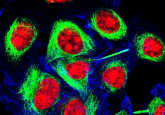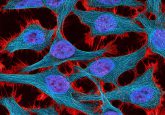Can we reprogram cancer cells destined for metastasis?

Research presented at the joint meeting of the American Society for Cell Biology (ASCB) and the European Molecular Biology Organization (EMBO) 2019 gives hope for the development of future therapeutics targeting potentially metastatic cancer cells.
A series of abstracts presented at ASCB|EMBO 2019 (Washington DC, DC, USA, 7-11 December 2019) have shed light on the cellular and molecular mechanisms that drive cancer cells to metastasize. Understanding the mutations that result in this phenotype could present a potential therapeutic target that will arrest cells destined for metastasis.
First, researchers from several branches of the National Institutes of Health (MD, USA) explained how they utilized a zebrafish model to study metastatic organotropism, the preferential metastasis of certain cancer types to secondary organs.
Breast cancer cells, which specifically targeted the brain and bone marrow, were injected into a xenograft metastasis model. A combination of mechanical mapping, live-cell imaging, cell migration assays and quantification of vascular architecture were utilized to analyze brain- and bone marrow-targeting subclones. This strategy demonstrated that vessel topography was vital in the process of cell arrest.
Mass spectrometry of the subclones implicated β1 integrin and myosin 1B as key players in the determination of metastatic locations. In a β1 integrin knockdown model, extravasation was reduced in the bone marrow and exacerbated in the brain. The inverse was observed in myosin 1B knockdowns. This research demonstrates that differences in extravasation ability influence organ selectivity following cell arrest, opening new avenues for therapeutic intervention.
- Has the mystery behind a common cancer mutation been solved?
- Ge Wang and Margarida Barroso on the HOTGEM imaging technology for breast cancer
- Microvesicles could revolutionize cancer therapeutics
Next, Veena Padmanaban (Johns Hopkins; MD, USA) provided clarification on the role of E-cadherin (E-cad) in metastasis. The loss of E-cad has previously been thought to promote metastasis. By utilizing murine models of luminal and basal breast cancers, it was demonstrated that the loss of E-cad induces increased invasion and dissemination. Despite this, the deletion of E-cad inhibits metastasis.
The loss of E-cad led to a reduction in metastasis by decreasing the amount of circulating tumor cells, decreasing the potential of tumor seeding, decreasing metastatic outgrowth and inhibiting migratory persistence. These results suggest E-cad’s role as a survival factor during detachment, dissemination and the seeding phases of metastasis. While more research is needed, the targeting of E-cad could form the basis of future therapeutic development.
Finally, Jason Sheltzer (Cold Spring Harbor Laboratory, NY, USA) presented a strategy for the elimination of aneuploidy from cancer cells. Chromosome dosage imbalances are prevalent in cancer cells; however, current understanding of how this affects the progression of cancer is limited.
In this study, a novel CRISPR-based, positive–negative selection was utilized to remove recurrent aneuploid chromosomes from cancer cells. These cancers were then observed to proliferate more slowly and experienced cell cycle decay at a greater rate than the untreated cells.
Crucially, the aneuploidy-deficient cancers were nearly completely unable to form tumors or undergo anchorage-independent growth, which greatly impedes their metastatic potential.
The research presented at ASCB|EMBO 2019 advances the current understanding of the cellular and molecular processes that contribute to metastasis. These characterizations of vital molecular pathways and the development of novel strategies for the inhibition of potentially metastatic mutations provide new avenues for the future of therapeutic development.





